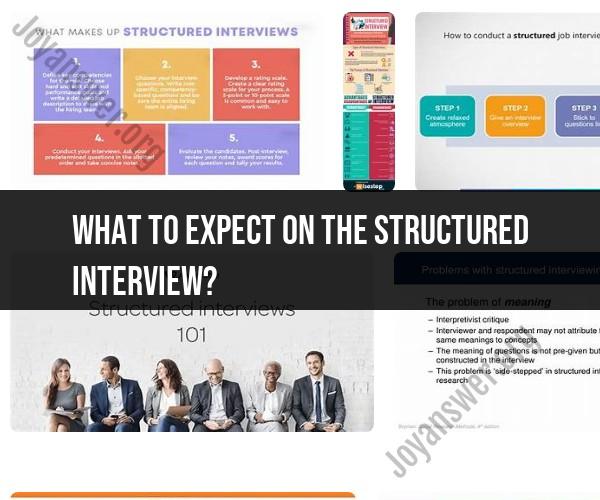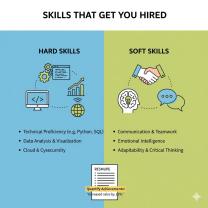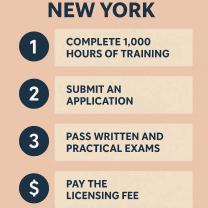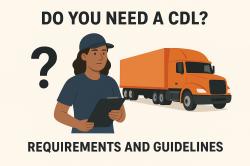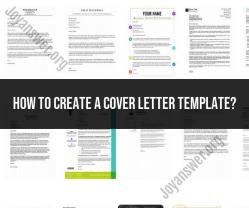What to expect on the structured interview?
When participating in a structured interview, it's essential to know what to expect so that you can prepare effectively and perform your best. Here's what you can typically anticipate during a structured interview:
Consistency: Structured interviews are designed to be consistent for all candidates or participants. This means that each interviewee will be asked the same set of questions in the same order, and the evaluation criteria will be applied uniformly.
Predetermined Questions: Interviewers will have a predefined list of questions that they will ask. These questions are carefully crafted to assess specific skills, experiences, or competencies relevant to the role or research.
Behavioral Questions: Structured interviews often include behavioral questions that ask candidates to provide examples of past experiences or behaviors in specific situations. For example, "Can you describe a time when you had to resolve a conflict with a coworker?"
Evaluation Criteria: Interviewers will have specific evaluation criteria or scoring guidelines to assess your responses. They will rate your answers based on how well they align with these criteria.
Objective Assessment: The goal of structured interviews is to provide an objective assessment. Interviewers will avoid injecting their personal biases and will make evaluations based on the information you provide.
Limited Follow-up Questions: Structured interviews typically have limited follow-up questions or probing. Interviewers may ask you to clarify or provide additional details, but they won't engage in extensive, unstructured discussions.
Time Constraints: Structured interviews are usually timed, so you may have a specific amount of time to respond to each question. Be concise and focus on providing relevant information.
Scoring: Your responses may be scored or rated on a numerical scale. The scoring system allows interviewers to compare candidates objectively.
Preparation: It's crucial to prepare for a structured interview by reviewing the job description or research objectives, understanding the organization or research context, and practicing your responses to common interview questions.
Professionalism: Approach the structured interview with professionalism. Dress appropriately, arrive on time, and maintain a positive and respectful demeanor throughout the interview.
Feedback: In some cases, you may receive feedback on your performance or a summary of your scores. This can be helpful for your personal development.
Follow-up Steps: Depending on the purpose of the interview, there may be follow-up steps, such as additional interviews, assessments, or evaluations.
Remember that the specific format and structure of a structured interview can vary depending on the organization, industry, or research context. Some structured interviews may include a mix of behavioral questions, technical questions, and situational questions.
To prepare for a structured interview:
- Review the job description or research objectives to understand what the interviewers are looking for.
- Practice answering common interview questions using the STAR method (Situation, Task, Action, Result) for behavioral questions.
- Prepare examples from your experiences that demonstrate your qualifications.
- Familiarize yourself with the organization or research topic to show your genuine interest.
By understanding what to expect and preparing accordingly, you can increase your confidence and perform well in a structured interview.
Preparing for Success: What to Expect in a Structured Interview
Structured interviews are a type of interview in which the interviewer asks a series of pre-defined questions in a specific order. Structured interviews are often used in hiring because they can help to reduce bias and ensure that all candidates are asked the same questions.
Here are some things to expect in a structured interview:
- The interviewer will ask you a series of pre-defined questions. These questions will be designed to assess your skills and experience related to the job you are interviewing for.
- The interviewer will ask you to provide specific examples to support your answers. This will help the interviewer to better understand your skills and experience.
- The interview will be more formal than an unstructured interview. The interviewer will likely follow a specific script and will not allow much deviation from it.
- The interview may be shorter than an unstructured interview. Structured interviews are typically shorter than unstructured interviews because the interviewer does not need to spend time developing questions.
Tips for Preparing for a Structured Interview
Here are some tips for preparing for a structured interview:
- Research the company and the job position. This will help you to understand what the company is looking for in a candidate and to prepare for the types of questions that you may be asked.
- Practice answering common interview questions. There are a number of common interview questions that you can find online and in books. Practice answering these questions so that you can give clear and concise answers during your interview.
- Be prepared to provide specific examples to support your answers. When answering interview questions, be sure to provide specific examples of your skills and experience. This will help the interviewer to better understand your qualifications.
- Dress professionally and arrive on time for your interview. First impressions are important, so be sure to dress professionally and arrive on time for your interview.
Structured Interviews: A Guide to the Interview Process
Structured interviews are typically conducted in the following order:
- Introduction: The interviewer will introduce themselves and explain the interview process.
- Overview of the job position: The interviewer will provide an overview of the job position and the company.
- Questions for the candidate: The interviewer will ask the candidate a series of pre-defined questions.
- Questions for the interviewer: The candidate will have the opportunity to ask the interviewer questions.
- Closing: The interviewer will thank the candidate for their time and explain the next steps in the hiring process.
Navigating Structured Job Interviews: Tips and Insights
Here are some tips and insights for navigating structured job interviews:
- Be prepared to answer a variety of questions. Structured interviews typically cover a wide range of topics, so be prepared to answer questions about your skills, experience, education, and career goals.
- Be honest and authentic in your responses. The interviewer is trying to get to know the real you, so be honest and authentic in your responses.
- Be concise and to the point. Structured interviews are typically time-constrained, so be concise and to the point in your answers.
- Ask thoughtful questions of your own. The interview is a two-way street, so be prepared to ask thoughtful questions of the interviewer. This will help you to learn more about the company and the job position.
By following these tips, you can increase your chances of success in a structured interview.
